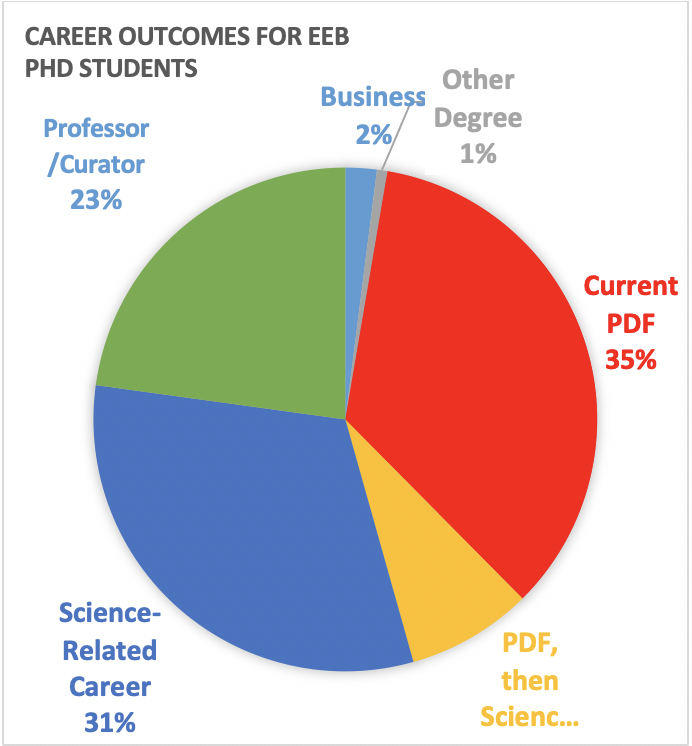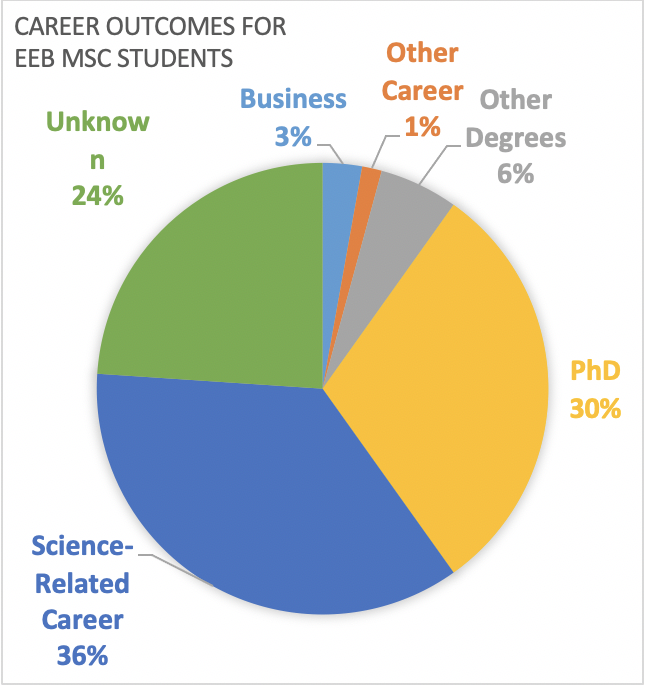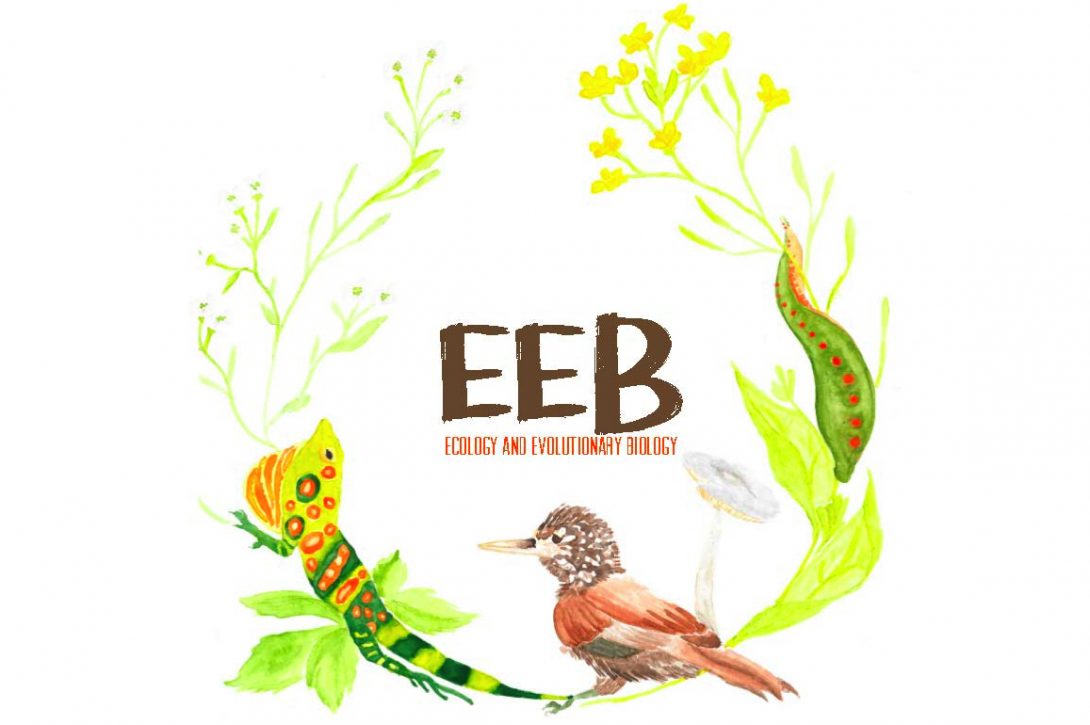Graduate
We offer graduate opportunities leading to both MSc and PhD degrees.
The Department supports approximately 150 graduate students, supervised by 50 faculty members at the St. George (UTSG), Mississauga (UTM) and Scarborough (UTSC) campuses, as well as by scientists at the Royal Ontario Museum (ROM), the Ontario Ministry of Natural Resources and the Federal Department of Fisheries and Oceans.
The main goals of our graduate programs are to help the development of thoughtful, versatile scientists who (i) perform innovative, publication-quality research, (ii) think critically, (iii) have mastered skills specific to their fields, (iv) excel at conveying their ideas and results in both written and spoken formats, and (v) go on to productive careers in their areas of interest and expertise. We are training the next generation of scientists who will face pressing societal issues that must be solved by highly trained ecologists and evolutionary biologists.
EEB’s diverse group of faculty offers students the opportunity to carry out research in core areas of ecology and evolution as well as related sub-disciplines including conservation, genomics, and molecular biology. With our faculty and their international and interdisciplinary collaborations, our students have opportunities to develop globally impactful research programs. Our award-winning faculty and the breadth of our program are recognized worldwide and attract many outstanding students to the EEB graduate program.
Research expertise of the faculty includes anatomy/physiology; behaviour; behaviour genetics; bioinformatics; community, population, ecosystem, landscape, evolutionary ecology; conservation biology; developmental biology; genetics/genomics; microbiology; molecular evolution; plant biology; taxonomy/systematics; theoretical biology.

Degree Programs
The Department of Ecology & Evolutionary Biology offers fully-funded, research-based MSc and PhD programs. Students develop a graduate thesis under the mentorship of a supervisor, with support from an advisory committee made up of other faculty.
MSc Program
Research & Coursework
MSc students develop competence in independent research, with the goal that their thesis work lead to a scientific publication. Students also complete a one-semester (0.5 FCE) graduate level course.
Evaluation
Progress is evaluated during regular meetings with the advisory committee. At the conclusion of the program, students defend their thesis in an oral examination.
Program Duration
Typical time to completion is 16-24 months, with funding guaranteed for the first 16 months. Exceptional students demonstrating outstanding progress in their MSc research may transfer into the PhD program at the end of their first year.
PhD Program
Research & Coursework
PhD students conduct original independent research programs that make substantial and innovative contributions to their fields. The thesis is composed of multiple chapters, each worthy of publication as a primary scientific paper. Students must also complete three or four one-semester (0.5 FCE) graduate level courses, depending on admission stream, by the end of their third year.
Evaluation
Progress is evaluated during annual or twice-annual meetings with the advisory committee, and in an appraisal examination and seminar midway through the program. At the conclusion of the program, PhD students must present their research in a public exit seminar, and defend their thesis in an oral examination.
Duration of Funding
The typical time to completion is 4-6 years. Doctoral students have funding guaranteed for 4-5 years, depending on admission stream. Funding beyond the guaranteed period may be available through departmental awards, teaching assistantships, or from the supervisor.
Campuses & Research Facilities
EEB graduate students at U of T can draw from a diverse group of highly acclaimed faculty from across the St. George, Mississauga, and Scarborough campuses, and the Royal Ontario Museum (ROM). Students may also collaborate with the Ontario Ministry of Natural Resources, and the Federal Department of Fisheries and Oceans.
EEB students also have access to state of the art research facilities, including greenhouses, growth chambers, a field research station at Koffler Scientific Reserve, and the Centre for the Analysis of Genome Evolution and Function.
University of Toronto Mississauga
University of Toronto St. George
University of Toronto Scarborough
Collaborative Specializations
Collaborative Specializations allow EEB students to simultaneously experience graduate opportunities in both their parent department and another program. Students can register in these specializations after being admitted.
Environmental Studies
The Environmental Studies (ES) Collaborative Specialization gives students an opportunity to specialize in an area of environmental research and gain exposure to a wide range of intellectual and methodological disciplines focused on environmental issues.
Genome Biology & Bioinformatics
The Collaborative Specialization in Genome Biology & Bioinformatics trains graduate students in the computational, theoretical, biochemical, structural, biological, and genetic approaches used to investigate the connections between genomes, transcriptomes, proteomes, and their various functions.
Careers after Graduation
After completing a graduate degree in EEB, the majority of our students continue in science or redeploy the skills they developed in graduate school in other careers.
PhD Graduates
We have been tracking the careers of former PhD student who graduated since 2006. Of the 149 PhD students who finished between 2006 and 2017, many (66%) have gone on to do postdocs. Of the ones who have moved beyond postdocs into their careers (n = 97), 34 (35%) them have faculty and/or museum curator positions and 47 have science related jobs. In other words, of these 149 PhD graduates, almost all of them do/are doing postdocs, have faculty positions, or are doing science-related work. As far as we know, the few students who have not found relevant employment are limited geographically by family or have been ill.

MSc Graduates
We recently started tracking the career paths of our MSc alumni. Of the 142 students, we are aware of the career paths of 108 of them. Of those, 43 went on to a PhD (40%) and 8 went on to other degrees. 51 went on to science-related careers including positions in government at all levels.

Practicalities
Already accepted to an EEB graduate program? Congratulations! See below for some next steps.
T-Cards
Your T-Card is your University of Toronto student ID card. It provides access to services and facilities such as libraries, athletic facilities, exams, online learning portal, printing services, and more.
UTORid & Student Web Service (ACORN)
Your UTORid is a personal identifier used to access University of Toronto online services, including the Student Web Service, ACORN. It is created for you when you receive for your T-card.
University Email Accounts
UTmail+ is the University’s official email service, used by students, faculty, and administration for University-related correspondence.
Please create your University-issued email account and link it with your student account on ACORN.
University Health Insurance Plan (UHIP)
The University Health Insurance Plan is a mandatory health insurance plan for all international and exchange students enrolled in an Ontario university. UHIP helps to cover the cost of hospital and medical services you may need to maintain your health while in Canada. You are automatically enrolled in UHIP, and the coverage charge will be listed on ACORN, your student account.
Domestic students are already covered by provincial healthcare plans, and so are not eligible for UHIP.
Housing
Graduate students may apply to live in U of T’s graduate residence Grad House, or those who have a spouse/partner and/or children may apply for student family housing. Many graduate students also choose to live off-campus.
Registration & Fees
Login to ACORN to register, pay tuition or defer payment.
At the beginning of each academic year, students must register and pay their tuition + other fees (or defer fees until April 30) in order to attend classes or use university facilities.
Registration deadline is mid-Sept (check EEB Grad Handbook). After the final date, you will be required to show proof of payment and register at the School of Graduate Studies (SGS). A late registration fee of $44 plus a $5 per additional day to a max of $94 will be charged.
Students in the funded cohort may register without payment (deferring fees). Students who are out of the funded cohort should contact the EEB Grad Office for a deferral form.
Fees paid by doctoral students in the final year of their program are pro-rated and based on the 12-month academic year. These fees are based on the date the thesis is submitted to the School of Graduate Studies, not the date of the thesis defense. It can take SGS several weeks to adjust the final amount of tuition owed after the thesis is submitted. PhD students who submit their final thesis with all corrections and modifications by Sept. 15 do not pay fees for the Sept. session but, after this date, a charge applies for each month in which degree requirements are not completed by the 15th of the month.
For a table of monthly charges contact: gradadmin.eeb@utoronto.ca. Students whose time limit for degree completion has expired but wish to return (for a max of 12 months) to defend a thesis are required to be reinstated and pay a reinstatement fee. For further information contact the gradadmin.eeb@utoronto.ca
Graduate students may apply for affiliation with Mississauga or Scarborough campus if they meet specific criteria.
Funding & Finances
Financing Your Studies
Information about graduate funding, scholarships, and available financial aid.
Graduate Guidelines
Graduate Student Handbook
Everything you need to know about life as an EEB Graduate student in one handy PDF.
Graduate Student Association (EGSA)

The Ecology and Evolutionary Biology Graduate Student Association (EGSA) represents all EEB graduate students across our three campuses.
Important Dates
- Sessional Dates & Deadlines
- Please review the School of Graduate Studies (SGS) Calendar for the most up to date info
Recommended Read
- The EEB Quarterly A digital publication in the style of a general-interest magazine made by and for graduate students in the department.
